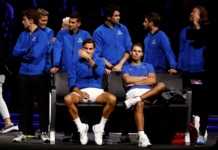Andy Murray brought Great Britain level at 1-1 after day one of the Davis Cup quarter-final against France in London.The British number one saved three set points in the second set as he beat world number 12 Jo-Wilfried Tsonga 7-5 7-6 (12-10) 6-2 at Queen’s Club.
Gilles Simon had earlier beaten James Ward 6-4 6-4 6-1 in Friday’s opening singles match.
The best-of-five tie will continue with the doubles on Saturday followed by the reverse singles on Sunday.
“There is always extra pressure, extra nerves,” Murray said of representing Great Britain.
“The one thing about Davis Cup is, if you lose, you still have the opportunity to come back the next day and win. But the pressure of playing for your country is obviously different. I’ve always enjoyed it.”
Captains Leon Smith and Arnaud Clement now face the biggest test of their weekend as they each look to select a pairing capable of winning Saturday’s crucial doubles match.
BBC tennis correspondent Russell Fuller |
|---|
|
“James Ward was not able to summon the spirit of Glasgow and San Diego on this occasion, but Andy Murray played superbly, and was able to raise his game to an even higher level when the first and second sets were on the line. |
|
“Returning a number of 135mph Tsonga serves was one of the keys to victory, and the relative brevity of the match should increase Murray’s chances of returning to contest the doubles on Saturday – not that he was giving anything away.” |
“We’ve got to get back and check how everyone is and we’ll have a discussion about it,” said Smith.
The winners of the tie will go through to face Australia or Kazakhstan in September’s World Group semi-finals.
Doubles dilemma
The official word is that Jamie Murray and Dom Inglot will face Nicolas Mahut and Richard Gasquet in Saturday’s doubles, but there could be a long evening of discussion ahead for both teams.
With the captains able to change their line-ups any time until an hour before play, there is every chance that changes will be made.
Smith must decide whether to call on Andy Murray for all three days, after he won his opening match in straight sets, and if so whether to team him with his brother or the big-serving Inglot.
“I always want to play but I’ve also had a long few months as well, and it’s about doing what’s best for us to win the tie,” said Andy Murray.
“I also need to try to be fresh for Sunday as well, but we’ll chat about it and see and hopefully I can play.”
Clement could use any combination of his world-class squad, but it is almost certain that Mahut will feature on one side of the court.
Murray too strong for Tsonga
The world number three extended his dominance over Tsonga to 11 wins in 13 matches to keep Britain’s hopes very much alive.
Murray came through a tense second set tie-break during which he suffered a nasty fall, but ran away a convincing winner in the third.
The Scot made the initial breakthrough with some terrific returning to clinch the first set in game 12, and recovered from losing his serve at the start of the second to force a tie-break.
Tsonga knew he had to win it to retain a realistic chance and he went close as both men served well under pressure.
It was the French number two who cracked first, however, choosing to leave a Murray return at 11-10 that dropped inside the baseline before chasing it down and thumping a forehand long.
Murray was well and truly in command when Tsonga double-faulted to drop serve at the start of the third and, despite having to fend off several break points, the Scot secured the home side’s first point after two hours and 34 minutes.
GB team captain Leon Smith |
|---|
|
“What Andy did was exceptional. There was a lot of pressure on him. At 1-0 down you have to get that rubber on the board and he did a great job with that yet again with an inspirational performance. |
|
“I thought that second set tie-breaker shows why he’s the player he is. I thought he was immense.” |
“Both of us served extremely well in the second set tie-break and I got a bit of a lucky return on the set point,” said Murray.
“He served 137mph out side and I managed to get my racquet on it and it dropped in.”
Simple for Simon
It was always going to be a tall order for Ward, the world number 89, to overcome 11th-ranked Simon, and so it proved.
The Londoner began solidly enough, missing an early break point thanks to an unkind net cord, but facing a first break point on his own serve in game five he could only hammer a smash into the net.
The Briton’s forehand began to let him down as Simon grew increasingly comfortable from the baseline, drawing 51 unforced errors over three sets.
A semi-finalist on the same courts at last month’s ATP event, the Frenchman broke for a 2-1 lead in the second set and three times in the third.
“It was a great match for me,” said Simon. “I got lucky to have an early break in each set and I’m really happy about the match I played today.”
Ward said: “It was very difficult. He moves very well. Even when I feel like I’m being aggressive, I can’t go for too much because he gets a lot of balls back. It was very windy, so to time the ball perfectly is very difficult.”
Queen’s Club gathers support
“It was a great atmosphere,” was Murray’s verdict after day one of the first Davis Cup tie to be hosted by the west London club in 23 years.
“A lot of people were asking me, ‘At the Queen’s Club are they going to create a Davis Cup atmosphere?’ and I think they proved everybody wrong today. It was absolutely fantastic.
“It’s a pleasure to play in front of crowds like that. We’re going to need more of that same support in the next couple of days if we want to get the win.”
Queen’s Club provided a very different backdrop to Glasgow, the venue for the first-round match against the United States in March, and around 850 French supporters more than held their own in a crowd of 6,900.
“They were pretty loud,” Ward said after his match. “It’s definitely a different crowd from Glasgow.
“It’s tough to say I’m disappointed, because it’s not as if I gave the crowd much to shout about. It’s also difficult to recreate the same as Glasgow – an indoor arena’s always going to be different to outdoors, so maybe that’s a factor.”















